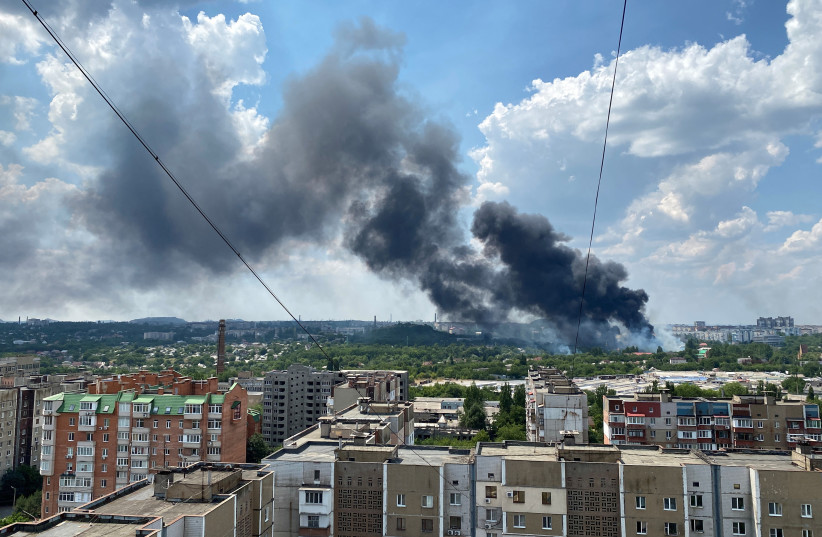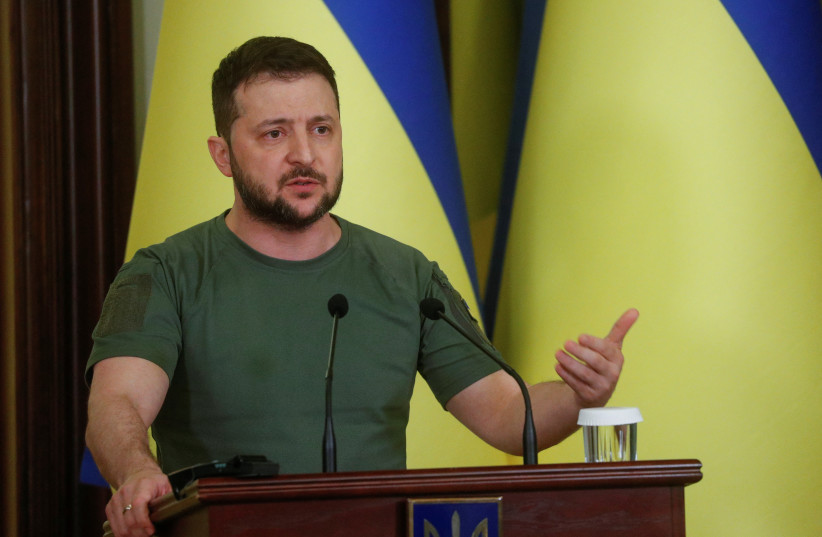In 2014, French-Jewish philosopher and internationally renowned opinion maker Bernard-Henri Lévy (BHL) stood onstage at Maidan square in Ukraine.
Ukrainians were demonstrating in the freezing cold winter and hoping to get closer to the European Union, instead of strengthening their connections with Russia.
It was already then that BHL realized that in the near future, Russia would invade Ukraine and create the devastating war that we’ve been seeing in recent months.
BHL recently released a documentary film, Why Ukraine, where he displays his travels in the battlefields of Ukraine. On the ground at the front line of the country’s civilian resistance, he records the war in Ukraine and urges Europe to take action. The film resonates as an appeal for help in the name of democracy.
On Wednesday evening, i24NEWS hosted the movie premiere in Israel at the Tel Aviv Museum. Distinguished guests included i24NEWS owner Patrick Drahi and Ukraine Ambassador Yevgen Korniychuk.
Lévy, 73, is one of the leaders of the Nouveaux Philosophes (New Philosophers) movement, which he co-founded in 1976. He is one of the most esteemed and best-selling writers in Europe.
BHL is the author of over 30 books, including works of philosophy, fiction and biography. He is a columnist for Le Point, El Pais, Corriere de la Sera, The WorldPost, The Wall Street Journal, The New York Times, and others.
He spoke with The Jerusalem Post, while visiting Israel this week.

What made you want to create a movie about the current war?
Anxiety, and revolt against the extreme extent of the disaster, the total war which was launched, without any reason, against a whole people and civilians. This was a terrible situation. And I felt anxiety because I immediately had a sense that something huge was at stake, something which concerned not only Ukraine, not only the region, but Europe as a whole and the international order, more generally.
So this twofold feeling – first of all, horror, disgust, sorrow; secondly, anxiety and the feeling that we were at the epicenter of disaster, whose extent was worldwide – these two things gave me the sentiment that I had to do this movie.
<br>When did you actually start working on it?
In March, just after the war broke out, very early on.
<br>I saw in the film that you met President Volodymyr Zelensky, who is a proud Jew, and you were also on the front lines. Were there any Jewish aspects to your meetings and experiences in Ukraine?
There’s so many Jewish aspects about Ukraine: historic sites, the president himself and a large and thriving Jewish community.

Did you run into any kind of elements or topics that had to do with Judaism during the filming?
During every step of my movie there were elements of Jewishness. Judaism is, as you well know, a central part of my thought. It is always a part of my way of entering into an issue. So, of course, the entire time that I was filming, something was reminding me of the destiny of Judaism in Europe.
First of all, I was in the country of the “Holocaust by Bullets,” and secondly, I was in the country of Central and Eastern Europe (Ukraine), which has done the most profound and deepest work of sorrow and mourning on this topic. I started this film in the only country in the world, except for Israel, which had a [Jewish] president and prime minister (former prime minister of Ukraine Volodymyr Groysman). Both are proud and affirmative Jews.
<br>Can you give me an example of a specific story that exemplifies what you’re just talked about, which is substantial Jewish essence?
One example which I encountered at every step of this filming is that I met so many Ukraine fighters whose model was the IDF, whose model was Jewish heroism. Sometimes it was the story of Masada, and other times it was the Six Day War. In the city of Mariupol, for example, the fighters were absolutely inhabited by the feeling and by the precedent of Masada. On the front lines in the south, in Mykolaiv, it was the same. In all the places where the Ukrainians repelled the Russians, the model was the glorious and victorious Jewish Zionist army, fighting against an enemy who was much more numerous and with more powerful means. I met many Ukrainians who seek inspiration in Israel.
<br>When you met President Zelensky, did anything come up regarding Judaism?
When I met the president just before his election, one of the questions I asked him was: “Is it possible in the country of the Holocaust by Bullets, to have an elected president who is a Jew?” His response was that this question, that of his religion, is not a problem for his election. “This is probably at the bottom of the list of those grievances directed toward me,” Zelensky said. To be a Jew is less of a problem today in Ukraine than in other countries in the area, such as Romania and probably less of a problem than in France.
<br>As a French Jew, can you see a situation where a French president would be Jewish? Can you see anything like that happening in the near future?
We had Laurent Fabius, Dominique Strauss-Kahn, Pierre Mendès France... we had many important political figures who were Jewish, but none of them was elected president, for different reasons.
In Ukraine, Zelensky’s Judaism did not prevent him from becoming president, and this is one of the strong signs that Ukraine has properly undertaken the work of mourning, remorse, reparation, tikkun olam, which is the sacred, the saintly work for any people who, at one point, engaged in mass antisemitism.
Ukraine has done a lot more than all the neighboring countries in this arena, and certainly much more than Russia, which has done nothing. Russia has not mourned this part of its history.
<br>You mentioned that it caused you to think a little bit about the future of Jews and in Europe. How, in your perspective, does the Ukrainian war influence the entire continent – with regard to Jewish communities?
Nobody can forget in the West that Zelensky is a Jew and that three of his uncles were massacred in the Holocaust. So, he is a Jewish hero. A Ukrainian hero and patriot. But also a Jewish hero. He has now entered into the hall of glory of Jewish heroism. His fate affects the place of Judaism in the imagination of the modern world. If he wins, if he loses, it will not be neutral for the Jews in the world.
<br>Were there any parts while filming in Ukraine where you felt it was dangerous or you were fearing for your life?
This is my sixth film on or around the battlefield. There are always moments of fear, where I dread something bad may happen. But all my life I have been in these circumstances, yet also had the obscure feeling that “it will be okay.”
I have been blessed by so much love from my parents, my family, my friends who read my work, who count on me, that it helps me to continue working all these years. I have felt blessed for so many decades, and this has helped me to stand firm and write, all the time, including in these dangerous circumstances where anything can happen.
<br>Did you ever imagine that you would see millions of women and children, with suitcases or bags, marching for miles and miles, crossing the borders of their country as refugees?
Yes. I imagined it years ago. Let me explain: The film begins much before the Russian-Ukrainian war of February 2022; it starts with the Maidan Uprising [in 2013] and during the Revolution of Dignity in February 2014. I am on the Maidan square, addressing the crowd, and am petrified by the feeling that the worst is to come, that Putin will not let this democratic experience continue; that Putin will take revenge. I was terrified by this, and I said it to the crowd. This scene opens the movie. I said to the crowd: “I will leave Kyiv with a heavy heart, because I know that the worst is possible.” I’ve been dreading this moment for eight years; I hoped it would not come, but I expected it.
<br>True. I, too, covered the Maidan up close and felt that something bad was approaching. This is the same with the pro-Russian separatists that took over eastern Ukraine.
I was in Donbas two years before the war. I wrote for many newspapers. I spent a lot of time in these areas. I walked all over, and I drove 400 kilometers, all the way from Mariupol to Donetsk and Luhansk.
So, I know this front line. And again, I knew that it was about to explode, that the Russians were about to attack. I spent days and nights with these brave Ukrainians, defenders of freedom. And all of them told me: Mr. Lévy, when you are back in France, or travel to America and, of course, when you visit Israel, the Russians are waiting for a window of opportunity, for a window to crush us, to attack and to invade. Therefore, I knew this was coming.
<br>There was a big controversy between Israel and Ukraine when President Zelensky spoke via Zoom at the Knesset and he made an equivalence of the Holocaust to the situation in Ukraine. What do you think about this?
There is no equivalent to the Holocaust. Thank God; otherwise it would be terrible. There was no equivalent before the Holocaust, and there will not be any equivalent after the Holocaust. It is a crime which, alas for us Jews, has a horrible singularity. So, no comparison is possible; no equivalence is possible.
But what happens in Ukraine is a war crime, a crime against humanity on a huge scale.
<br>Did you meet any members of the Jewish communities while filming?
I did, of course, but I also encountered Jews who are on the front line fighting for their twofold identity: Ukrainian and Jewish. You have a lot [of Jews] on the front line, in the battalions. For example, there is one battalion which has been criminalized, satanized by Putin, which is the Azov Battalion. There are Jews in the Azov Battalion.
<br>What do you think the world should learn from this war? You would think that Western countries would be able to stop this war, yet they didn’t.
We were very late, too late trying to stop it. This is, alas, how democracies work often. The Western democracies did not stop the Armenian Genocide. The West did not stop the massacre of the Spanish War in 1936. They did not stop the Holocaust. They never rescued the victims of Stalinism. They did not rescue, nor did they prevent these horrible massacres, devastating criminalities in Ukraine. Alas, it’s shameful for Western democracies, but it’s the way it is. •
